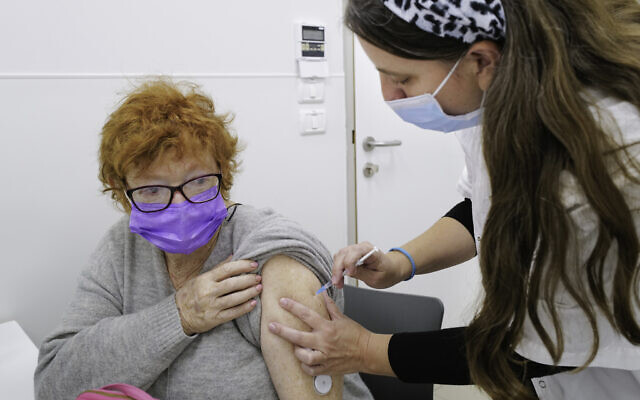Hailing recommendation by panel of health experts, Bennett orders swift roll-out of extra vaccine booster for people over 60, immunocompromised and health care workers

Israel is set to begin offering a fourth COVID-19 vaccine shot for over 60s, some at-risk groups and medical personnel, in line with a recommendation Tuesday from a panel of health experts.
Prime Minister Naftali Bennett welcomed the recommendation and ordered that officials prepare a campaign to distribute the vaccines, meaning Israel is likely to become the first country in the world to roll out a fourth dose for certain groups.
The experts, a government body called the Pandemic Treatment Staff, recommended that medical personnel, adults over the age of 60 and other at-risk groups get the fourth dose, after waiting at least four months since the third dose.
Eight-six percent of experts in the group favored the move.
The decision needs final approval from Health Ministry Director-General Nachman Ash before it goes into effect.
“This is wonderful news that will assist us in getting through the Omicron wave that is engulfing the world,” Bennett said in a statement.
Bennett said the additional shot would also be administered to health care workers.
“The citizens of Israel were the first in the world to receive the third dose of the COVID-19 vaccine, and we are continuing to pioneer with the fourth dose as well,” the prime minister said.
Israel previously pioneered a third booster shot, rolling it out for at-risk groups before expanding the program to the general population weeks later, before much of the rest of the world. Over four million Israelis have received the third dose, out of 9.3 million people.
Research on a fourth vaccine dose is being carried out at the Sheba Medical Center but has not yet been published.
Sheba said that it is conducting a study of the feasibility of a 4th shot in a trial among some 200 volunteers, examining the effect of antibody levels. The hospital said it was the first such trial in the world and would be carried out in cooperation with the Health Ministry.
Prof. Galia Rahav, who heads Sheba’s infectious diseases unit and is on the expert panel, said the decision to recommend the extra boosters was “not simple” given the paucity of data showing that the protection offered by the third shot was waning. “But at the same time. there are terribly frightening numbers from what is happening in the wider world,” she told Army Radio, referring to the fast-spreading Omicron strain.
Scientists don’t know everything about Omicron yet, but they say vaccination should offer strong protections against severe illness and death. Initial figures have also shown the strain to be even more contagious than the Delta strain.
Bennett and Health Minister Nitzan Horowitz have raised the possibility of a fourth dose for weeks, but Health Ministry experts had advised against the move, including in a decision last week. Bennett earlier said he was waiting “impatiently” for the fourth dose to be approved, predicting a new wave of infections was unstoppable.
The Omicron threat has spurred new calls for Israelis to get vaccinated, including children, by health officials and government leaders.
The Health Ministry said Tuesday that 170 new cases of the Omicron variant of the coronavirus had been confirmed in Israel, doubling the number of infections.
There have been 341 verified Omicron cases in Israel to date, the Health Ministry said in a statement. Another 807 infections were “highly suspected” to be Omicron cases, but were awaiting verification.
Lawmakers have renewed restrictions to curb infections in recent days, including bans on international travel and public workplace capacity.
As reported by The Times of Israel
